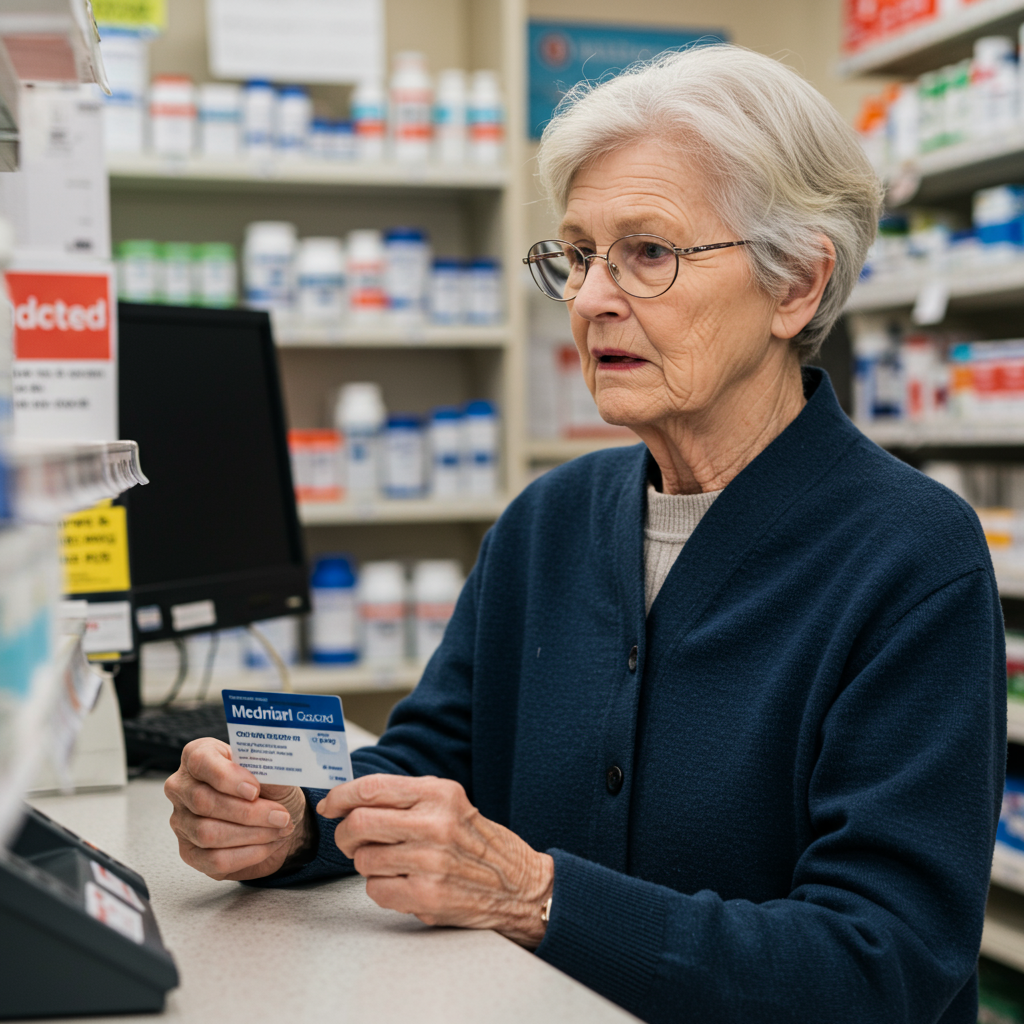The rollout of the updated COVID-19 vaccine has introduced a significant challenge for many older Americans relying on Medicare. Despite official assurances and the Food and Drug Administration’s (FDA) approval, eligible individuals are encountering unexpected hurdles, including coverage delays and out-of-pocket costs at the pharmacy. This situation has led to widespread frustration and uncertainty, contradicting statements from federal health officials and leaving many seniors questioning their access to this crucial immunization.
Navigating the New COVID Vaccine Landscape
The latest COVID-19 vaccines, developed to combat evolving strains like Stratus, are now available, but their access is far from straightforward. The FDA granted approval for these updated shots last month, specifically targeting a narrower, high-risk population. This marks a notable shift from previous universal recommendations, creating confusion among the public and healthcare providers alike.
Eligibility and FDA’s Narrowed Focus
Under the FDA’s new guidance, the updated COVID-19 vaccines are primarily recommended for two groups: individuals aged 65 and older, and younger people with specific underlying health conditions. These conditions can include common issues such as asthma, cancer, heart or lung problems, obesity, and diabetes, significantly broadening the scope of “high risk” even among younger adults. This targeted approach has been a departure from earlier policies, where vaccines were broadly recommended for almost everyone aged six months and up. Experts like Dr. Paul Sax from Brigham and Women’s Hospital note that many people not yet 65 will still qualify based on these criteria.
The Medicare Coverage Conundrum
For seniors, the expectation is clear: once the FDA approves a vaccine, Medicare should cover it. However, the reality on the ground has been different for many. Reports from across the country indicate a systemic issue where Medicare’s billing and claims processing systems at various pharmacies have not been updated in time. This prevents immediate, free access for eligible beneficiaries, compelling them to either pay the full cost out-of-pocket—often around $225—or return at a later date, hoping for system updates.
Real-World Impact: Patient Experiences
The confusion surrounding vaccine coverage isn’t merely theoretical; it’s impacting real people. Allison Engel, a 74-year-old from Pasadena, California, shared her experience at a local CVS. She was informed the vaccine would cost $225, receiving a “rejection letter” because Medicare’s system had not yet registered the coverage. Unwilling to wait, Engel paid out-of-pocket, hoping for future reimbursement. Similarly, Brant Mittler, 78, and his wife in San Antonio faced the identical problem. Their pharmacist confirmed that numerous Medicare patients were encountering the same issue. While the Mittlers eventually received their shots after the system was updated days later, their initial struggle highlights the widespread nature of this problem.
Conflicting Messages from Leadership
These patient experiences stand in stark contrast to public statements made by Health Secretary Robert F. Kennedy Jr., who oversees Medicare. Secretary Kennedy informed a Senate committee that most Americans would be able to receive the COVID shot from their pharmacy for free. Following the FDA’s limited approval, he reiterated that “Anybody can get the booster” and “Most Americans will be able to get it from their pharmacy.” This disconnect between federal assurances and on-the-ground reality has only amplified public confusion and eroded trust in the vaccination process. Arthur Caplan, head of medical ethics at NYU Langone, voiced concerns that these access issues exacerbate public uncertainty regarding eligibility and risk.
Unpacking the Regulatory Maze
The current predicament is rooted in a complex interplay of federal guidance, regulatory processes, and state-specific laws. While the FDA’s approval of the vaccine is a critical step, other factors heavily influence its availability and coverage.
The Role of CDC and ACIP
A major source of the current confusion stems from changes within the Centers for Disease Control and Prevention (CDC) and its Advisory Committee on Immunization Practices (ACIP). Traditionally, ACIP’s recommendations have been the “gold standard” for vaccine guidelines and a trigger for broad insurance coverage. However, Secretary Kennedy’s decision earlier this year to replace all ACIP members has stalled the usual process. ACIP’s new committee was not scheduled to meet until September 18-19, leading to a vacuum of clear federal guidance. While Medicare technically doesn’t need to wait for ACIP’s sign-off once the FDA approves a vaccine, as confirmed by vaccine policy expert Dorit Reiss, the absence of ACIP recommendations still creates complications, particularly for commercial insurers and some state pharmacy laws.
State-Specific Challenges and Solutions
Access to the updated COVID vaccine varies significantly by location. Nineteen states have laws requiring ACIP recommendations before pharmacists can administer vaccines. In the absence of such recommendations, patients in these states might need a doctor’s prescription. CVS, a major pharmacy chain, stated that in 13 states and Washington, D.C., Medicare patients would need a doctor’s prescription until ACIP issues its recommendations. Furthermore, in Massachusetts, Nevada, and New Mexico, CVS initially stated they wouldn’t offer the shot at all until ACIP acted.
However, some states are taking proactive measures. Massachusetts, for instance, has circumvented federal delays. Governor Maura Healey’s administration issued a “standing order” – essentially a blanket prescription – for the latest COVID booster for everyone over five. The Massachusetts Division of Insurance also mandated that all state-regulated insurance carriers cover vaccines recommended by the state’s public health agency, irrespective of CDC guidance. This state-level initiative aims to ensure broad access despite federal policy shifts. Neighboring states like Connecticut and Rhode Island are reportedly collaborating with Massachusetts on shared vaccination policies, attempting to create regional stability amidst federal “chaos.”
Insurance Coverage Beyond Medicare
For those not on Medicare, the insurance coverage landscape for the new COVID vaccine remains fluid. The Affordable Care Act (ACA) generally requires commercial insurers to cover vaccines recommended by ACIP at no cost. If ACIP aligns its recommendations with the FDA’s narrower criteria (65+ and high-risk), healthy individuals under 65 without these conditions might face out-of-pocket costs, typically ranging from $140 to $160. Many employers and insurers previously covered the full cost due to ACIP recommendations, but this may change. While some large providers like Kaiser Permanente and Walmart (for its employees) have committed to continued coverage, others may not. Insurers often weigh factors like preventing costly hospitalizations and keeping employees healthy when making coverage decisions, but the lack of clear ACIP guidance introduces considerable uncertainty. Self-insured health plans, which are federally regulated under ERISA, are not subject to state mandates, adding another layer of complexity.
Commercial Plans and Out-of-Pocket Costs
Without insurance, the cost of the updated COVID-19 vaccine can be a significant barrier. Pharmacy chains have indicated prices around $225 for those paying out-of-pocket. This financial burden, coupled with the confusion around eligibility and coverage, can deter individuals from seeking vaccination. The Centers for Medicare and Medicaid Services (CMS) has acknowledged the problem, stating they are “looking into the issue,” but a swift resolution to these system-wide delays is critical for public health.
Broader Implications and Ongoing Concerns
The current vaccine rollout issues are symptomatic of broader shifts in federal health policy. Secretary Kennedy’s actions, including cuts to vaccine technology, canceled research, mass resignations at the CDC, and the overhaul of health councils, have created an environment of uncertainty. The removal of emergency-use authorizations for COVID-19 vaccines further underscores this transition.
The Shifting Vaccination Strategy
This fall marks a significant pivot, with some experts predicting it might be the first respiratory virus season where the COVID vaccine isn’t widely recommended for most people. There’s conflicting guidance even on high-risk groups; for example, Kennedy revoked guidance recommending pregnant individuals get boosters, despite pregnancy being a CDC-listed high-risk condition. Organizations like the American Academy of Pediatrics have even released their own immunization schedules, citing a loss of credibility in the federal process. Despite these complexities and a significant decline in vaccine uptake since the pandemic’s height, experts continue to emphasize the importance of vaccination for eligible groups to mitigate winter surges and protect against severe illness. An updated vaccine provides immunity against circulating variants, which, while not perfect, helps the body respond faster to new infections.
Frequently Asked Questions
Why are Medicare patients facing delays for the new COVID vaccine?
Medicare patients are experiencing delays primarily due to unupdated billing and claims processing systems at pharmacies. Despite the FDA approving the updated COVID vaccine for eligible groups (65+ and high-risk), many pharmacy systems haven’t yet integrated the coverage information for Medicare. This systemic lag forces patients to pay out-of-pocket or wait, directly contradicting assurances from Health Secretary Robert F. Kennedy Jr. The ongoing changes within the CDC and its Advisory Committee on Immunization Practices (ACIP) also contribute to broader confusion among healthcare providers and patients regarding updated guidelines.
How can I check my eligibility and access the updated COVID vaccine?
To check eligibility, confirm you are aged 65 or older, or have an underlying health condition that qualifies you as “high risk” under FDA guidelines (e.g., asthma, cancer, heart disease). For access, first contact your specific pharmacy to inquire about their current coverage status for Medicare patients. Be aware that some states, like Massachusetts, have proactive policies simplifying access (e.g., “standing orders”), while others may require a doctor’s prescription if ACIP recommendations are still pending. If initially denied coverage, ask if they can schedule an appointment for a later date when their systems might be updated, or inquire about reimbursement if you choose to pay out-of-pocket.
Will I have to pay out-of-pocket for the new COVID vaccine if I’m on Medicare?
While Medicare is expected to cover the updated COVID vaccine for eligible beneficiaries once FDA-approved, many individuals are currently being asked to pay out-of-pocket due to delays in pharmacy system updates. This cost can be around $225. If you pay out-of-pocket, keep your receipt and contact Medicare or your pharmacy for information on potential reimbursement once the systems are updated. Commercial insurance coverage for younger, healthy individuals without underlying conditions may also be uncertain if ACIP’s future recommendations are narrowly focused, potentially leading to out-of-pocket costs ranging from $140-$160.
Staying Informed and Getting Vaccinated
The landscape of COVID-19 vaccination is more complex than ever. From shifting federal guidance and political interference to state-specific regulations and pharmacy system delays, navigating access to the updated vaccine requires persistence. Despite these challenges, health experts continue to recommend vaccination for eligible individuals, particularly seniors and those with underlying health conditions, to protect against severe illness during the upcoming respiratory virus season. Stay informed by regularly checking official Medicare resources, consulting your primary care provider, and communicating directly with your local pharmacy about their current vaccine availability and coverage policies. Advocating for your access is crucial to ensure you receive this important protection.



